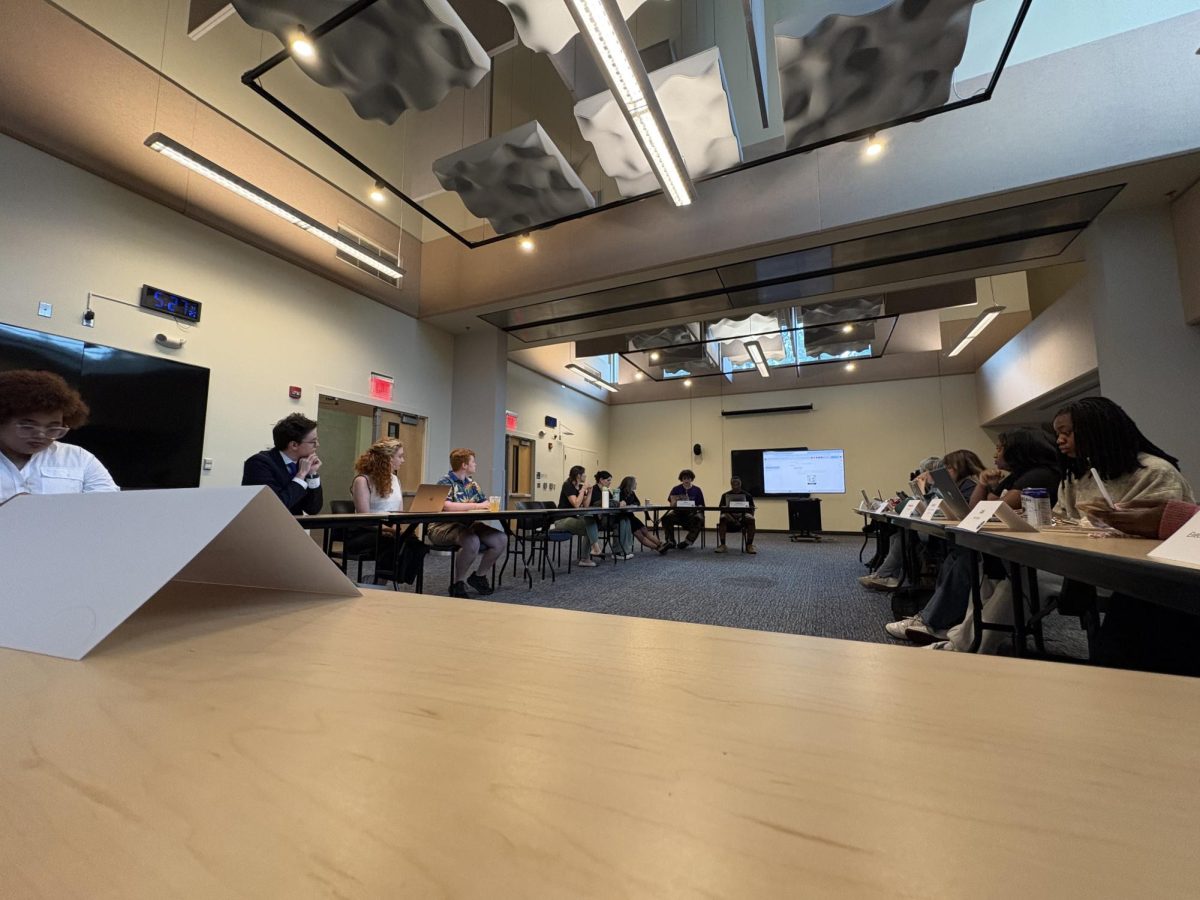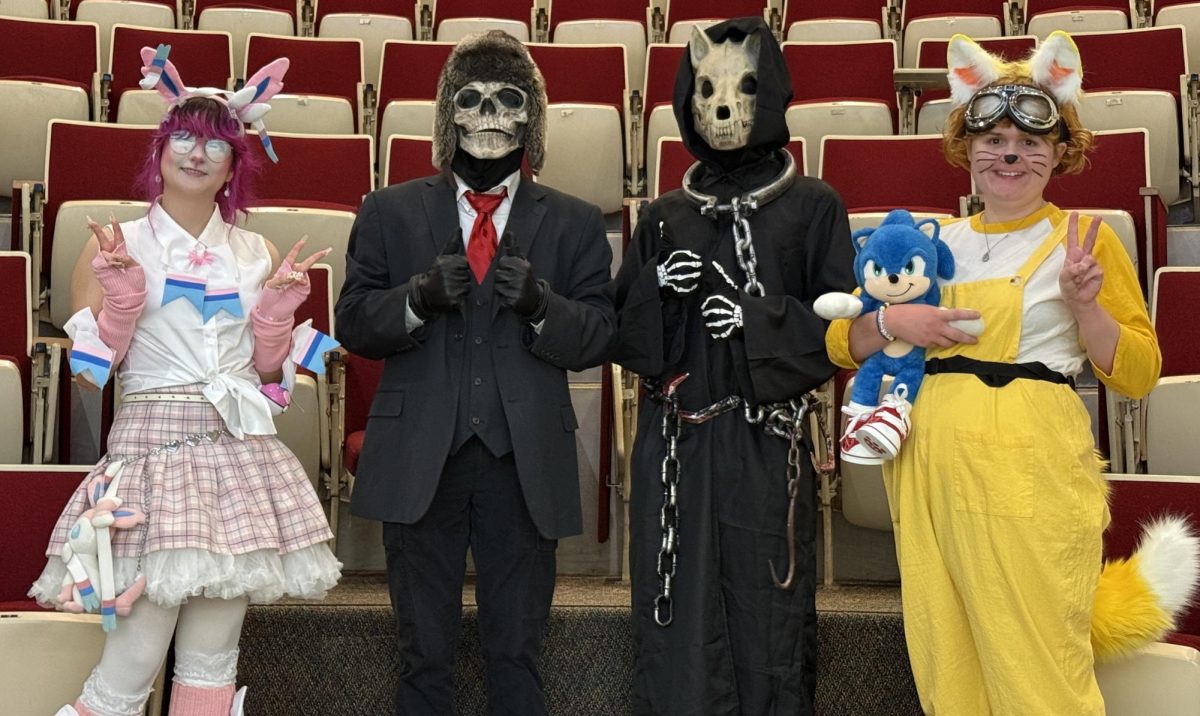Courtney Garcia

News Writer
[email protected]
As UNC Asheville students and staff go into their third week of classes, they are met with masked faces, hand sanitizer outside of every door, signs on the floor and socially-distanced classes.
Chancellor Nancy J. Cable said last spring, on Mar. 13, the UNC System asked each of the 17 institutions in their jurisdiction, including UNCA, to transfer all classes to remote learning only. This semester, students return to class in a hybrid format with a myriad of new protocols and heightened anxiety.
“It was a herculean effort and our faculty and the academic support staff who helped the faculty deserve gold medals for it. It was incredible,” Cable said. “In the end, we were able to move 98 percent of our courses onto the online platform and let almost all of those students complete their spring semester.”
Cable said the sudden switch left many students without a place to go and without internet access. At that point, she said the school began to focus on the needs of the individual students.
“We allowed a number of our students to stay in the residence halls, mostly students who literally couldn’t go home and have any broadband and whose educational progress we cared about,” she said.
As in-person classes ended in March, Cable said the school still had about 250 to 300 students still in the residence halls. Throughout the remainder of the semester, that number dwindled down to around 160.
In late April and early May, the UNC system shifted their efforts toward the fall semester, placing emphasis on how to put health protocols in place to ensure a safe return for both students and faculty, according to Cable.
“We began purchasing the PPE, preparing the campus by de-densifying the classrooms, while faculty expressed to us, ‘Alright, I’m willing to teach in person,’ or ‘I really want to be online only and continue that,’ or ‘I’m willing to be a hybrid.’ So we began working with each faculty and each department chair to determine what’s best,” Cable said.
On Aug. 10, UNCA
opened its doors to more than 3200 students, faculty members and staff.
“We’ve opened with all of the prescribed protocols. We have a community statement that says we will wear masks, we’re going to social distance. We know that each one of us taking care of ourselves is giving health to everybody else, including the families of our faculty and staff,” Cable said.
UNCA’s Academic Support Staff also installed social distancing guidelines across campus, including a communications campaign on the three W’s: wash your hands, wait for your six feet of distance and wear your mask.
Emma Dasco, a senior majoring in health and wellness and minoring in psychology, said she can understand why UNCA decided to choose a hybrid format but it is just a matter of time before that changes.
“I’ll probably give it until the end of Aug. considering public health in our country,” she said.
During her first in-person class, Dasco said her teacher was also recording the lesson for students who have opted for remote learning.
“I’m already thinking for next week I’m not incentivized to go to that class,” she said. “When he pulled up the remote learning option, I was like, ‘I’m still motivated enough to attend the remote learning class and I will genuinely take notes.’ It’s just that I could’ve made myself a really nice breakfast and be in bed.”
Mustapha Braimah, a visiting assistant professor and the director of dance at UNCA, began teaching last fall. According to Braimah, for the entire summer, every professor worked to figure out the best ways to navigate the pandemic and provide a healthy and stable learning environment for incoming students.
“How are you going to maintain social distance and still achieve connection, dynamic levels, space and all of those elements in creativity? It’s hard, but you know, it’s a matter of time,” Braimah said. “Everything that we do, it has to include social distancing, a mask and all those beautiful protocols.”
For the fall semester Braimah adopted a hybrid teaching schedule: one class in person and the other online. He said he is enjoying the hybrid classes but they can be very challenging, especially for a dance class.
“It’s still different but they can see me and I can speak to them. With Zoom and your music, sometimes your count is delayed and sometimes we have internet issues; a lot of people freezing,” Braimah said. “But they know we’re all trying our best.”
Braimah expressed some appreciation for the semester, calling it a good learning opportunity for himself as an instructor.
“Everything has shifted, but it has taught me to appreciate everything. It has taught me that little is good, you know, a little bit is fine, it’s a lot,” Braimah said. “I still expect a lot from my students, but I’m a lot more supportive than I used to be. I don’t want them to have to deal with any issue, because we are all already dealing with a lot of issues. So it has taught me to be a better teacher.”
According to the UNCA COVID-19 reporting webpage, the school has 10 positive cases as of Aug. 23.
“UNC Asheville came together in what we know how to do: take care of each other, be respectful, basically follow the rules where healthcare and healthy attitudes are important. So we’ve been able to open with some, knock-on-wood, success here,” Cable said.
Cable said the school has set aside quarantine and isolation rooms for students who have been exposed, are waiting for the results of a test or have tested positive.
“For those students, we’re delivering their meals, all of their courses are online. And so again, it’s keeping students moving along with their educational progress that matters,” she said.
When discussing options for the opening of the fall semester, Cable said they were planning to test everyone coming on to campus. However, after exploring the option, the school realized that due to lack of both money and supplies, it was impractical.
“What is wise is to test anybody who, with each one of us saying to ourselves, ‘Do I have a sore throat, do I have a fever, do I feel GI problems, am I feeling like I’m hot and have a fever?’” she said. “Those are the times when we should test and we have great capacity for testing.”
According to Cable there has been very little pushback since the decision to open.
“Some faculty, some staff and some students throughout the summer were saying ‘Is it really wise to open? Can you do it safely?’” Cable said. “But I think everybody’s trying to make it work.”
Brenna Johnson, a junior majoring in environmental studies, said they are taking all hybrid classes this semester. Johnson said although they have missed in-person classes and are glad to be back in school, they are stressed about the uncertainty.
“I am hopeful that our small campus can continue to follow social distancing guidelines so no outbreaks occur, but I know it’s not that simple. Many students work in the service industry, putting them at higher risk of exposure,” Johnson said. “A uniquely great thing about our campus is that Greek life isn’t huge here, so hopefully that means less parties.”
Johnson said they are cynical as to why the school chose to open.
“It’s obviously about money. Based on my limited understanding of how colleges allocate their money, salaries typically come from tuition and fees, not the university endowment, like’d you assume. So universities are incentivized to bring students back. If we had online-only classes, the uproar against full tuition and fees would be a nightmare,” Johnson said. “It’s a double-edged sword, because if funding cuts are made, which they most certainly will be because of lower enrollment, professors are let go, with tenured professors prioritized over others.”
According to Cable, she does not have the authority to make the decision about whether or not the school should remain hybrid or move to strictly online. If there would be change in the learning format, it would have to come from the president of the UNC System Peter Hans in consultation with Cable and the board of governors.
“And what would cause that pivot, you might ask me? It might be that we have clustered outbreaks like Chapel Hill saw earlier that last weekend. If we would have a positive testing rate, a positivity rate on the number tested that would go higher than the health department would allow that would trigger a pivot,” Cable said. “I think right now because our students, faculty and staff are leaning forward, and basically wearing masks, which is the most important thing, and social distancing and hand hygiene. I think we’ve got it kind of covered for right now.”


















